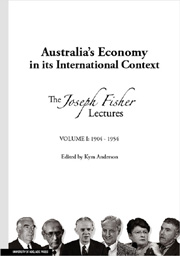Book contents
- Frontmatter
- Contents
- Preface
- List of lectures in volume 2 (1956-2009)
- Contributors to opening chapters
- The benefactor Joseph Fisher
- The lectures
- The lecturers
- 1 1904 – Commercial education
- 2 1906 – Commercial character
- 3 1908 – The influence of commerce on civilization
- 4 1910 – Banking as a factor in the development of trade and commerce
- 5 1912 – Australian company law, and some sidelights on modern commerce
- 6 1914 – Problems of transportation, and their relation to Australian trade and commerce
- 7 1917 – War finance: Loans, paper money and taxation
- 8 1919 – The humanizing of commerce and industry
- 9 1921 – Currency and prices in Australia
- 10 1923 – Money, credit and exchange
- 11 1925 – The Guilds
- 12 1927 – The financial and economic position of Australia
- 13 1929 – Public finance in relation to commerce
- 14 1930 – Current problems in international finance
- 15 1932 – Australia's share in international recovery
- 16 1934 – Gold standard or goods standard
- 17 1936 – Some economic effects of the Australian tariff
- 18 1938 – Australian economic progress against a world background
- 19 1940 – Economic coordination
- 20 1942 – The Australian economy during War
- 21 1942 – Problems of a high employment economy
- 22 1946 – Necessary principles for satisfactory agricultural development in Australia
- 23 1948 – The importance of the iron and steel industry
- 24 1950 – The economic consequences of scientific research
- 25 1952 – Australian agricultural policy
- 26 1954 – The economics of Federal-State finance
6 - 1914 – Problems of transportation, and their relation to Australian trade and commerce
Published online by Cambridge University Press: 05 June 2012
- Frontmatter
- Contents
- Preface
- List of lectures in volume 2 (1956-2009)
- Contributors to opening chapters
- The benefactor Joseph Fisher
- The lectures
- The lecturers
- 1 1904 – Commercial education
- 2 1906 – Commercial character
- 3 1908 – The influence of commerce on civilization
- 4 1910 – Banking as a factor in the development of trade and commerce
- 5 1912 – Australian company law, and some sidelights on modern commerce
- 6 1914 – Problems of transportation, and their relation to Australian trade and commerce
- 7 1917 – War finance: Loans, paper money and taxation
- 8 1919 – The humanizing of commerce and industry
- 9 1921 – Currency and prices in Australia
- 10 1923 – Money, credit and exchange
- 11 1925 – The Guilds
- 12 1927 – The financial and economic position of Australia
- 13 1929 – Public finance in relation to commerce
- 14 1930 – Current problems in international finance
- 15 1932 – Australia's share in international recovery
- 16 1934 – Gold standard or goods standard
- 17 1936 – Some economic effects of the Australian tariff
- 18 1938 – Australian economic progress against a world background
- 19 1940 – Economic coordination
- 20 1942 – The Australian economy during War
- 21 1942 – Problems of a high employment economy
- 22 1946 – Necessary principles for satisfactory agricultural development in Australia
- 23 1948 – The importance of the iron and steel industry
- 24 1950 – The economic consequences of scientific research
- 25 1952 – Australian agricultural policy
- 26 1954 – The economics of Federal-State finance
Summary
The problem of transportation is the problem of civilisation. National progress rests upon production – the full use of natural resources – and production and distribution determine trade and commerce, and profitable business ultimately regulates wages and governs the standard of living. At one time economists held that Commerce made transportation and controlled it. The accepted axiom today is that transportation determines commerce by encouraging or checking industrial growth. Not mileage, but the cost of carriage is the true commercial measure of distance. The traders who can reach the markets of the world most cheaply control the commerce of the world. Railways, roads, and rivers, are factors of the first magnitude in the industrial and social life of a nation, for unless transportation is available production in excess of the most elementary personal needs is useless and commerce impossible. The theory of efficient means of transit is reducing the unit in the cost of production. Increased production stimulates consumption, multiplies avenues of employment, and adds to private and national wealth from which the community draws daily sustenance.
Australia as a wealth producer
Australia is essentially a producing country. Public credit has been pledged for money to build railways and roads and make harbours in order to facilitate the development of resources and shipment of products on such an economic basis as will meet all costs, and leave the grower, carrier, and trader a margin of profit.
- Type
- Chapter
- Information
- Australia's Economy in its International ContextThe Joseph Fisher Lectures, pp. 123 - 158Publisher: The University of Adelaide PressPrint publication year: 2009



